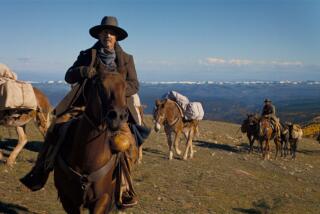Bad days at Black Hills for developer Costner : Lakota Sioux object to the movie star’s proposed land swap in what’s considered tribal territory.
DEADWOOD, S.D. — In the final scene of “Dances With Wolves,” a Lakota warrior sits on horseback, atop a limestone cliff in the Black Hills. Wind In His Hair shouts to his departing white comrade, Lt. Dunbar: “Can you not see that you will always be my friend?”
Always? In the movies, maybe. In real life, Kevin Costner’s relationship with the Lakota Sioux has hit a rocky patch.
Indians in South Dakota are angry about Costner’s proposed land swap with the U.S. Forest Service. “It’s our treaty land,” says Virginia White Calf, a 41-year-old activist who likes to remind people she’s a grandmother. “The Black Hills are not for sale--or swap.”
Like most Native American land issues, this one is complicated.
Costner and his older brother Dan want to acquire 630 acres of federal land adjacent to a $100-million resort casino they are building on private property on the outskirts of Deadwood.
The government land, much of it in Slaughterhouse Gulch, is part of the Black Hills National Forest. The Costners would use it for a golf course, a reservoir, hiking trails and a railhead to link the resort by train to Rapid City, S.D., 50 miles away.
In return for Slaughterhouse Gulch, the Costners would buy 585 acres in Spearfish Canyon and give it to the Forest Service. Ironically, that land is a 15-minute drive from where Wind In His Hair shouted his last lines.
The Forest Service likes the trade because the land in Spearfish Canyon is spectacular, environmentally delicate and currently owned by Homestake Mining Co. Slaughterhouse Gulch, on the other hand, is almost completely surrounded by private land.
The western Sioux--who prefer their own name for themselves, Lakota--have a different view. They still regard the Black Hills as their land. Treaties in 1851 and 1868 did recognize Lakota ownership of the Black Hills, but Gen. George Armstrong Custer discovered gold there in 1874. The government soon forced the Lakota to sign a treaty that was literally a steal. In 1980, the U.S. Supreme Court found the government guilty of “ripe and rank” behavior. However, instead of returning the land, the court upheld an earlier cash settlement.
The Lakota tribes have refused the money, although it has grown to more than $400 million in an interest-bearing account. “They will never take the cash,” says Sidney Keith, 75, a Lakota spiritual leader. “They want the land back.”
Keith joined White Calf and about 100 others in a spiritual gathering Saturday on a ridge above Slaughterhouse Gulch. A group of singers from the Cheyenne River Reservation set up a drum in a small clearing in the Ponderosa pine forest. They sang about “Paha Sapa,” the Black Hills. Then Keith offered prayers in Lakota. As he prayed, backup whistles beeped on heavy equipment clearing a nearby hilltop.
That image might be less poignant to locals, who remember the hilltop was a salvage yard full of junked cars before the Costners bought it. But the protesters of the Black Hills Protection Committee don’t think the resort is an improvement. Cheyenne River Sioux Tribal Chairman Gregg Bourland told Indian Country Today that “if you think Homestake has dug up the land, you should see what Kevin Costner has done.” He suggested a new role for Costner: George A. Custer.
“What he’s doing to his own land is a desecration,” White Calf said. “But we can’t stop that.” The Lakota tribes do hope Congress will someday return federal land in the Black Hills, which is one reason the chairmen of five Sioux tribes have opposed the Costner trade.
Given the overwhelming opposition of South Dakota’s 9-to-1 white majority, a wholesale return of land is a long shot. But the Lakotas, who began their legal battle in 1920, vow never to give up.
“This is a sacred place,” Keith says.
Treaty issues aside, the Costners can argue they have been good friends to the Lakota.
Kevin Costner, who has mostly avoided getting involved in the dispute, continues to help focus national attention on Native American issues. He recently hosted the CBS television documentary “500 Nations,” which tried to correct inaccuracies in Eurocentric history books.
Dan Costner wrote to one protester that his family has quietly donated $350,000 to Native American causes since 1992.
Nor did the Costners invent gambling in South Dakota. Several tribes operate their own casinos on reservations.
Kevin Costner was filming “Dances” on location when casino gambling was legalized in Deadwood. He and his brother bought a Main Street building and opened the Midnight Star casino the following year.
Their new resort will be Deadwood’s largest and fanciest, by far, with 320 rooms, two theaters, indoor and outdoor pools, a health club and other amenities.
For Keith, the size of the project speaks louder than Costner’s good works. “He’s a greedy man,” Keith says.
The Forest Service will take public comment on the land swap until June 19. Approval is likely, despite the protests. The Costners say they will build the rest of their project no matter how the swap turns out.
Their new resort’s name: The Dunbar.
More to Read
Sign up for Essential California
The most important California stories and recommendations in your inbox every morning.
You may occasionally receive promotional content from the Los Angeles Times.










